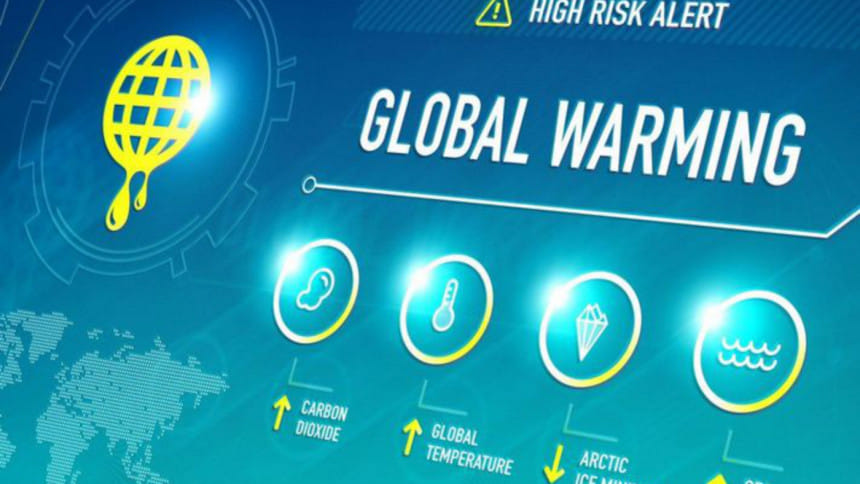Arguments for using AI to combat climate change

According to a report published by the World Meteorological Organization (WMO), in 2018 the average global temperature was recorded to be the fourth highest on record. Based on five separately conserved data sets on global temperature, the WMO report shows that the global average temperature in the first 10 months of 2018 was nearly 1 degree Celsius above the pre-industrial baseline, i.e., 1850-1900. In this regard, WMO Secretary-General Petteri Taalas states that if global temperature continues to increase according to the current trend, by the end of the 21st century, planet earth may experience a 3-5 degree increase in global temperature.
Although the global community has become united under the umbrella of the 1992 United Nations Framework Convention on Climate change (UNFCCC), according to Taalas, to battle against the adversities of climate change the steps taken by the states are not adequate to meet "climate change targets and rein in temperature increases." Hence, he adds, "it is worth repeating once again that we are the first generation to fully understand climate change and the last generation to be able to do something about it."
Combating climate change includes strategies for adaptations (preparedness for adverse impacts of climate change) and mitigation (reducing emission of greenhouse gases in atmosphere). For both adaptation and mitigation, technology is an important tool. Mitigation of greenhouse gas requires advanced technologies or energy efficient technologies in transportation, buildings, electricity systems, land use, etc. Besides, prediction of greenhouse gas impacts of old or newly invented technologies is also important for mitigation. Adaptation to climate change requires advanced technologies like risk prediction, climate modelling, disaster management or resilience planning.
Artificial Intelligence (AI) that often includes machine learning and deep learning can play a mammoth role in battling climate change. A recent study conducted by Massachusetts Institute of Technology (MIT) shows that machine-learning can intervene at least in 13 essential sectors for battling climate change. These sectors include building better electricity systems, monitoring agricultural emissions and deforestation, creating new low-carbon materials, predicting extreme weather events, making transportation more efficient, reducing wasted energy from buildings, arranging geo-engineering for a more effective earth, and providing people with the tools to reduce their carbon footprint. Microsoft, which initiates "AI for Earth" programmes, and has committed USD 50 million over five years for research and development of new AI applications, has denoted AI as a "game changer".
Discourses of both ethics and public international law, either directly or indirectly, encourage the application of AI in combating climate change. Although the 2015 Paris Agreement does not directly refer to it, the preamble to the agreement recognises "the need for an effective and progressive response to the urgent threat of climate change on the basis of the best available scientific knowledge." AI obviously falls under the notion of "the best available scientific knowledge". Besides, Article 4(1) of the Agreement acknowledges the necessity of applying "the best available scientific knowledge" for climate change mitigation and Article 7(5) calls for the same for climate change adaptation.
In connection with climate change, one important ethical concern is that countries which were least responsible for greenhouse gas emissions in the past are likely to suffer the most serious impacts. This issue is also considered as "historical contribution" factor for the principle of common but differentiated responsibilities and respective capabilities (CBDR-RC). Another important ethical concern is that the biggest victims of climate change are not in a position to blame or hold us to account. This is because they are either the poorer communities of the world, or unborn children of future generations or non-human creatures—e.g. plants and animals. This is also considered as a "respective capability" factor in the just mentioned principle of the United Nations Framework Convention on Climate Change (UNFCCC). These ethical issues do not only fall under the discourse of ethics, but are also dealt under the concept of environmental justice as well as the equity and sustainable development principles of international law.
All these ultimately call for urgent innovation, development and deployment of AI in the battle against climate change, and at the same time, necessitates transferring the same to poor communities who do not have access to these technologies. In line with this, Article 10 of the Paris Agreement requires for technologies essential to battling climate change be transferred to the poor and developing countries. Article 11 of the Agreement also calls for financial cooperation that includes cooperation for innovation, development and transfer of the required technologies.
While both ethical and legal discourses on climate change require development and deployment of AI to battle climate change, the innovation, transfer and deployment of AI is also dependent on several other factors. These factors include creating enabling environment for innovating AI applications, creating suitable market for newly innovated AI technologies, and above all, willingness of capable countries and business entities to invest in innovation, development and transfer of those kind of AI technologies which are essential for battling climate change. No single country can do this on its own initiative. All countries need to work together and come to a consensus and find a method of cooperating with each other in innovating and implementing AI to combat climate change where necessary.
In addition to the regular discussion on innovation and transfer of environmentally sound technologies, the issue of cooperation in innovation and transfer of AI demands special attention from the Conference of the Parties (COPs) to the UNFCCC.
Md Mahatab Uddin, PhD, is Visiting Fellow, International Centre for Climate Change and Development (ICCCAD) and Advocate, Supreme Court of Bangladesh.
Email: [email protected]

 For all latest news, follow The Daily Star's Google News channel.
For all latest news, follow The Daily Star's Google News channel. 



Comments